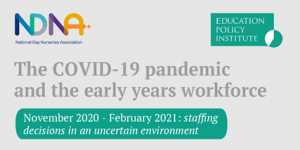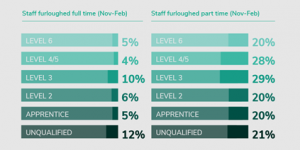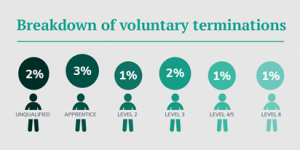Latest research: Early years sector is heavily reliant on the furlough scheme
Nurseries, pre-schools, and other early years settings have been heavily reliant on the government’s Coronavirus Job Retention scheme during the height of the winter lockdown, a new report from the Education Policy Institute (EPI) and National Day Nurseries Association (NDNA) finds.

The report, which looks at how early years settings in England, Scotland and Wales were impacted by the pandemic during the winter months, shows that a lack of demand for early years education from families and financial instability in the sector led to a large proportion of staff being placed on the furlough scheme.
Overall, up to around 4 in 10 (38%), early years staff were placed on full or part-time furlough between the months of November and February – nearly four times more than the sector had previously projected for this period (10%).
Staff with the lowest qualification levels bore the brunt of disruption to the early years workforce, as they were more likely to be placed on full-time furlough. These staff are also at greater risk of having their hours reduced or being made redundant, with settings reporting that they consider staff qualifications and experience when making changes to their workforce.
The new survey, which covers almost 800 private, voluntary, and independent (PVI) early years settings representing over 15,000 staff, also reveals stark findings on the scale of closures in the sector during the peak of the second wave of the virus.
As many as three-quarters (72%) of settings in England and Wales were forced into full or partial closures over the last few months, with children’s overall attendance around a quarter less than it was in the year before this, prior to the pandemic.
With lockdowns easing and demand from families for early years places set to increase again, researchers warn that without extra government support, many settings could struggle to meet these pressures, which in turn could threaten the quality of children’s early education.

Key findings:
- The early years sector is heavily reliant on the furlough scheme
- Overall, up to 38% of early years staff were on furlough between November 2020 and February 2021, with an average of 11% of staff placed on full-time furlough and 27% on part-time furlough. 38% represents a maximum figure, as some settings could have placed workers on both full-time and part-time furlough during the survey period.
- Official monthly figures for the UK population as a whole show that 13% of the total workforce were on furlough in November and December, while 16% were in January.
- The proportion of workers on furlough was also far greater than anticipated: in a previous survey, the sector expected just 10% of staff to be on the scheme over this period (3% on full time furlough and 7% on part-time furlough).
- It is likely that the increased use of furlough in the early years may have led to fewer redundancies in the sector during this period: on average, settings saw zero redundancies in their workforce.
The vast majority of early years settings saw closures during the winter lockdown:
- In England and Wales, 72% of early years settings have had to close fully or partially between November and February.
- The average number of children attending settings in these two countries was 28% lower than the previous (pre-pandemic) year.
- In Scotland, settings were asked to remain open only for vulnerable children and children of key workers during the national lockdown in early 2021, resulting in 84% of settings remaining open.

The impact of closures on staff:
- The number of overall staff in the workforce remained largely stable over the period between November and February, but there was significant variation between this: 31% of settings saw no change in the total number of staff they employed between November and February, while 54% had seen a rise and 15% had seen a fall.
- Staff with lower qualifications were more likely than other staff to have been placed on full-time furlough: 12% of the least qualified staff were placed on full-time furlough, compared to 5% of the most qualified staff (those with a Level 6 qualification).
- Those in between on Level 3 qualifications, who are officially counted in minimum staff-to-child ratios, which settings must maintain, were also much more likely to be on full-time furlough – 10% of such staff were over this period.
- This suggests that such staff are continuing to experience some of the most negative effects of the pandemic, such as reduced job security and income.
Commenting on the new report, Josh Cottell, author and Senior Researcher at the Education Policy Institute (EPI) said:
“This research shows that the furlough scheme has been of crucial importance to the early years sector over the winter period. We find that up to a third of staff in nurseries, pre-schools and other settings were furloughed, reflecting the huge drop in demand for early years places over lockdown, which in turn has led to closures and financial problems for settings.
“While the government’s wage scheme has temporarily kept many early years settings afloat, others may struggle to make it through this period of volatility. The concern now is that as society begins to open again and families resume early years education, the sector may be unable to cope with a sudden rise in demand for places.
“The government should provide additional support to the early years sector in the coming weeks and months, to help providers navigate this period of great uncertainty.”
NDNA’s Chief Executive Purnima Tanuku OBE said:
“It’s clear from the results of this research that this has been one of the most challenging periods for nurseries in all three nations. Settings dealing with Covid-19 cases have had to close rooms or even whole nurseries as a result of positive cases, staff absences and low occupancy. We have seen almost three quarters of respondents partially or fully close their nurseries and many having to do this multiple times between November and February.
“The impact of Covid cases has meant that more staff have been furloughed than providers had previously expected. To remain open and support families and children through difficult national lockdowns, childcare settings have faced additional costs like enhanced cleaning and having extra staff available to keep children in smaller groups. We have welcomed approaches by the Scottish Government that has made grants available to settings operating in lockdown conditions.
“As cases start to fall it is vital that governments see the impact on the early years sector and provide financial support to providers and invest in the early years workforce who have been on the front line. With more children returning to settings, providers need to be able to recruit and retain qualified staff.
“Looking ahead to the challenges children will face, it is clear early years professionals will need access to training that helps them support children who have faced disruption and traumatic experiences. Any post-Covid educational recovery must support children’s early years as they are the most important for a child’s life chances.”
- Covid-19 pandemic
- early years
- early years education
- England
- furlough
- impact of closures
- lockdown
- Scotland
- Wales
Similar Articles
New research shows early maths intervention gives children sustained progress

Stephen Morgan MP officially Early Education minister

